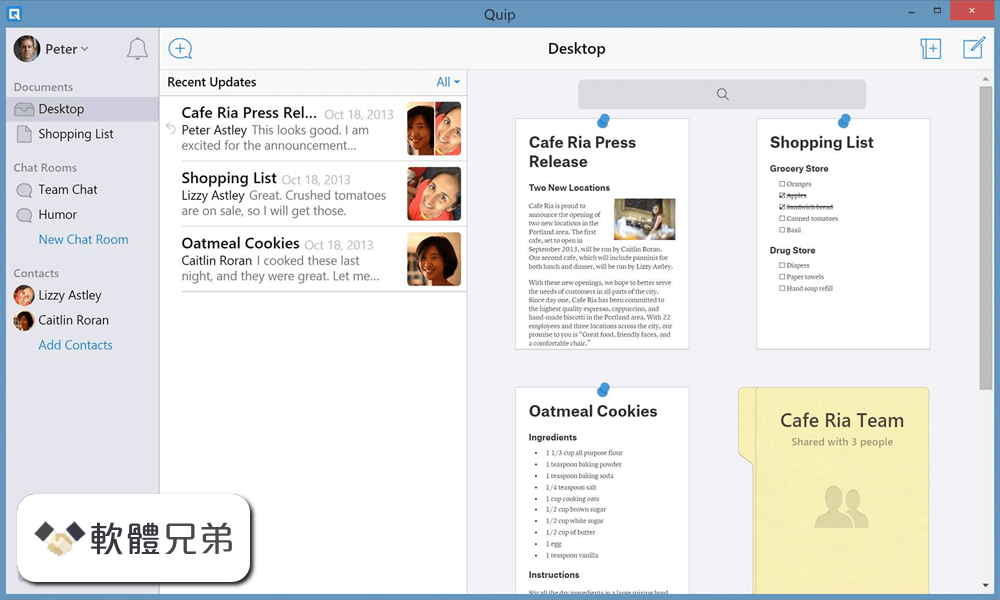OpenSSL 1.1.1l (64-bit)
Quip for Windows 這樣的非營利組織,無論您的 WiFi 連接速度如何還是與互聯網完全隔離,脫機時,您可以繼續創建文檔,編輯文檔和發送消息。只要有互聯網連接,所有的編輯就會與網絡同步,而且您正在使用的每個人都將看到您的更改.
當您在線時,所有事情都會實時發生。你可以看到人們在文檔上一起工作,並與他們實時聊天.
在線和離線之間的轉換是完全無縫的。因此,如果您的飛機互聯網連接速度極慢,其他用戶的更新將以盡可能快的速度流入,但速度緩慢的網絡不會影響您的體驗。 Quip for Desktop 是現代團隊一起工作的方式!從 FileHorse 立即下載 Quip 離線安裝程序用於 PC .
注意:30 天的文檔修訂歷史記錄。有限的功能.
也可用:下載 Quip for Mac
ScreenShot

| 軟體資訊 | |
|---|---|
| 檔案版本 | OpenSSL 1.1.1l (64-bit) |
| 檔案名稱 | Win64OpenSSL-1_1_1L.exe |
| 檔案大小 | |
| 系統 | Windows 7 / Windows 8 / Windows 10 |
| 軟體類型 | 未分類 |
| 作者 | Quip Team |
| 官網 | https://quip.com/blog/desktop |
| 更新日期 | 2021-08-25 |
| 更新日誌 | |
|
What's new in this version: Fixed an SM2 Decryption Buffer Overflow: OpenSSL 1.1.1l (64-bit) 相關參考資料
Changelog - OpenSSL
OpenSSL 1.1.1 — Changes between 1.1.1k and 1.1.1l [24 Aug 2021] ... Have 'config' recognise 64-bit mingw and choose 'mingw64' as the target platform ... https://www.openssl.org Download OpenSSL 1.1.0k (64-bit) Free - FileCombo
Download OpenSSL 1.1.0k (64-bit) for Windows PC from FileCombo. Fast update and Free Download Latest Version 2021 - FileCombo. https://filecombo.com Downloads - OpenSSL
A list of mirror sites can be found here. Note: The latest stable version is the 3.0 series. Also available is the 1.1.1 series which is our Long Term Support ( ... https://www.openssl.org OpenSSL
0 is now available: please download and upgrade! 24-Aug-2021, Security Advisory: two security fixes. 24-Aug-2021, OpenSSL 1.1.1l is now available, ... https://www.openssl.org OpenSSL (64-bit) - FileHorse
2021年8月25日 — Latest Version: OpenSSL 1.1.1l (64-bit) LATEST. Requirements: Windows XP64 / Vista64 / Windows 7 64 / Windows 8 64 / Windows 10 64. https://www.filehorse.com OpenSSL - 維基百科,自由的百科全書
TLS 1.3的開發由Akamai贊助。 主要版本釋出[編輯]. OpenSSL版本歷史 ... https://zh.wikipedia.org OpenSSL 1.1.1 and 3.0 x86x64 Binaries for Microsoft Windows
Microsoft Windows OpenSSL 1.1.1l and 3.0.0. 64-bit (Win64 / x64) and 32-bit (Win32 / x86) Binary Distribution. Digitally signed. Download for Free. https://kb.firedaemon.com OpenSSL 1.1.1 Series Release Notes
Major changes between OpenSSL 1.1.1k and OpenSSL 1.1.1l [24 Aug 2021] ... in the x64_64 Montgomery squaring procedure used in exponentiation with 512-bit ... https://www.openssl.org OpenSSL 1.1.1l (64-bit) - FileHorse
2021年8月25日 — OpenSSL 1.1.1l (64-bit). Date released: 25 Aug 2021 (4 weeks ago). Download · OpenSSL 1.1.1k (64-bit). Date released: 26 Mar 2021 (6 months ... https://www.filehorse.com version 1.1.1k - OpenSSL
Changes between 1.1.1l and 1.1.1m [xx XXX xxxx] *) Changes between 1.1.1k and ... [Richard Levitte] *) Have 'config' recognise 64-bit mingw and choose ... https://www.openssl.org |
|
